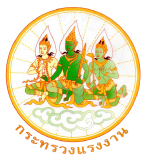The Permanent Secretary of Labour chaired the subcommittee meeting on promoting ethics in within the Ministry of Labour, which took place at the Executive Operation Room. The meeting discussed the establishment of a working team to drive the action plan on promoting ethics at the ministerial levels, as well as revised plans on preventing corruption and promoting ethics in the Ministry of Labour, through workshops on improving the Ministry of Labour’s services and promoting ethics to eliminate corruption.
The Permanent Secretary of Labour then met with the Ethics Committee at the Office of the Permanent Secretary, to oversee the drafting of the ‘Executive Ethics Statement’, which aims to promote executive members to fulfil duties ethically and morally. This will then be cascaded to subordinates to conduct themselves well under the 7 ethical items.
The Code of Ethics for Civil Servants sets 10 guidelines for civil servants to conduct in practice. This includes ensuring civil servants take an ethical standpoint and insist on doing what is right and fair and having a good conscience, responsibility, sacrifice, be transparent and verifiable. They are also expected to be able to dismiss personal issues and prioritize common gain, refrain from exploitation and conflict of personal and public interest, respect and adhere to the constitution and legislation and perform duties ethically and morally without political bias. The seventh item says that civil servants are expected to comply with government regulations and act quickly, and to communicate information to the public accurately. Civil servants are also expected to drive towards achievements, uphold democracy and the monarchy and be a role model and reserve the reputation of national civil servants.
#################
Bureau of Public Relations




